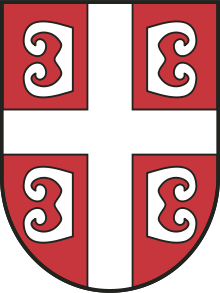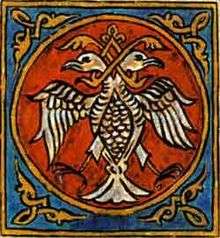Serbs of Vukovar
| Part of a series of articles on |
| Serbs |
|---|
 |
|
Native communities |
|
Related people |
The Serbs of Vukovar (Croatian: Srbi u Vukovaru; Serbian: Срби у Вуковару; Srbi u Vukovaru) are one of traditional communities that lives in the eastern Croatian town of Vukovar.
Population

The Croats were in the majority in most villages and in the region's eastern part, whereas the Serbs dominated in northwest. Vukovar's population was ethnically mixed and had 28 ethnic groups before the war. According to 2011 Croatian census, Serbian population of the town account 34.87% of Vukovar total population. Around town there are also municipalities Trpinja, Borovo and Negoslavci with Serbian majority and town share border with the Republic of Serbia on the Danube.
Organizations
The Consulate-General of Serbia is located in Vukovar established on 5 February 1998.
Other cultural and civic organizations are located in Vukovar and among them Association for Serbian language and literature in Croatia, Radio Dunav (Radio Danube) and local Prosvjeta.
Religious life
Church of St. Nicholas


Serbian Orthodox Church of St Nicholas in Vukovar is one of the oldest baroque buildings of the Serbian community north of the Sava River.[1] Present day church was built in the period from 1733 till 1737.[2] St Nicholas inventory along church itself, is stated separately in Register of Cultural Goods of Croatia as a collection protected cultural property.[3]
Next to the Church of St. Nicholas is located Serbian Home, established in 1733 with current building dating back to 1905.[2][4] Building is today subject to ownership dispute between town and Serbian Orthodox Church.[4] Since 1991 building is temporary facility for religious rites until church interior renovation of Church of St. Nicholas is completed.[4]
Political life
Independent Democratic Serb Party, established in 1997, is a social democratic political party of Serbs living in Croatia with its headquarter located in Vukovar. It have 3 out of 151 seats in Croatian Parliament. There is also non-parliamentary nationalist Party of Danube Serbs.
Headquarters of Joint Council of Municipalities, sui generis inter-municipal body formed on the basis of Erdut agreement, is located in Vukovar.
History
War in Croatia
Republic of Serbian Krajina
United Nations Transitional Administration
2010-today
According to 2011 Croatian census, the Serbian population account one third of town population, which is the legal prerequisite for obligatory introduction of Serbian (Cyrillic) name of the city to become co-official under Croatian Constitutional law on national minorities rights. In 2013, this has re-ignited a political discussion on the matter, continuing on the 2009 local promulgation of Serbian Cyrillic as available for public use.[5]
Gallery
.jpg) Saint Lazar, Serbian Great Prince, a copperplate by Zaharije Orfelin.
Saint Lazar, Serbian Great Prince, a copperplate by Zaharije Orfelin.
Notable individuals
See also
References
- ↑ Konstrukcija poslijeratnog prostora:Simbolička izgradnja Vukovara, Mateo Žanić, Institutu društvenih znanosti Ivo Pilar, POLEMOS: časopis za interdisciplinarna istraživanja rata i mira, Vol.XI No.22 Srpanj 2008.
- 1 2 "KULTURNO ISTORIJSKI SPOMENICI, ZGRADA SRPSKOG DOMA U VUKOVARU and -RODNA KUĆA I CRKVA U KOJOJ JE KRŠTEN ZAHARIJE ORFELIN U VUKOVARU". Consulate General of Serbia in Vukovar. Retrieved 2014-05-31.
- ↑ "Ministarstvo kulture-pretraživanje kulturnih dobara". Retrieved 2014-05-31.
- 1 2 3 "Православни храмови источне Славоније, Барање и западног Срема /14/" (PDF). Joint Council of Municipalities. p. 20. Retrieved 2014-05-31.
- ↑ Drago Hedl (2013-02-01). "Ekskluzivna reportaža iz Vukovara - Ćirilica će nevidljivi zid koji dijeli Hrvate i Srbe pretvoriti u betonski". Jutarnji list (in Croatian). Retrieved 2014-05-31.

